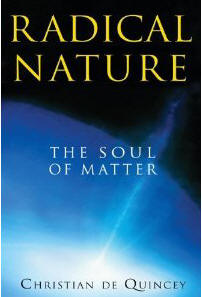MEANINGS
Language, Energy, and Consciousness*
An Excerpt from
By
New Age
holistic-spiritual metaphysicians and materialist reductionists make strange
bedfellows. Nevertheless, when it comes to talking about consciousness,
both turn to concepts and images derived from physics. Materialists claim
that consciousness is ultimately "nothing but" a form of matter-energy; New Agers often talk of consciousness or spirit in terms of
"vibrations," "waves," "fields," and so on, as though it were a form of subtle energy.
Why Consciousness Is Not Energy
If you tune in to
someone's "vibrations," are you picking up some form of energy they are
emitting--perhaps something we might call "psychic energy"? It may be
tempting to think so; to think of consciousness as a form of energy. But is
it? What might be going on when we say we feel someone's vibrations? Well,
one possibility is that their brain or their body could be sending out waves
of energy--something, perhaps, like electricity. If so, it must be far
more subtle than any form of energy known to modern science, because no
physical instrument yet devised has detected any such energy. But even if
the vibrations were subtle energy waves they would still be
physical
because they pass through space. Anything that moves through space must be
located
somewhere in space. And anything that is located in space can be measured.
That's what "physical" means: It occupies space. It is objective. It can
be measured.
But no one has ever
measured consciousness. No one has ever been able to pinpoint it in space.
If they had, questions such as these would make sense: "How big is
consciousness (or any of its contents, such as a thought, a feeling, a
desire) . . . is it an inch, a foot, a mile, a light-year?" or "Where
exactly is consciousness?" But such questions baffle us. Even though it is
absurd to talk about the "size" of consciousness, some people may not think
it so strange to say that consciousness (and its contents) is located
somewhere in the brain. But where? No one has ever succeeded in finding
any part of the brain (large or small) where consciousness is. Yes, it
certainly seems to be associated, or correlated, with the brain--but it is
not in the brain (not in the way your brain is inside your skull).
Consciousness has a completely different kind of interiority.
So if consciousness has
no size, and has no location, what does it mean to say it is in space? And
if it is not in space, what does it mean to say it is a form of energy?
Maybe, then, consciousness is a form of
nonphysical
energy? If that is the case, how are consciousness and energy related? We
have three options.
1. Consciousness is a physical
form of energy (even if it is very, very
subtle energy): If we say that consciousness is a form of energy that is
physical, then we are reducing consciousness (and spirit) to physics. And
few of us, unless we are materialists, want to do that.
2. Consciousness is a
nonphysical form of energy. If we say
that consciousness is a form of energy that is not physical, then we need to
say in what way psychic energy differs from physical energy. If we cannot
explain what we mean by "psychic energy" and how it differs from physical
energy, then we should ask ourselves: Why use the term "energy" at all?
3. Consciousness isn't any
form of energy. Our third alternative is
to say that consciousness is not a form of energy at all--either physical or
nonphysical. Unlike energy, which is some kind of "stuff " that spreads
out in space, consciousness isn't made of stuff and is not located in
space. If this is true, then consciousness would not only be different from
energy but also would be
nonlocated.
This is not to imply that
consciousness has nothing to do with energy. In fact, according to
panpsychism or radical naturalism, consciousness and energy always go
together. They cannot ever be separated. But this is not to say they are
not distinct. They are distinct--energy is energy, consciousness is
consciousness--but they are inseparable. So, for example, some spiritual
traditions talk of kundalini experience, where a meditator may feel a rush
of energy up the chakra system . . . but to say that such energy flow is
consciousness is to mistake the object (energy flow) for the subject, for
what perceives (consciousness) the object.
Note the two
importantly distinct words in the phrase "feel the rush of energy . . ."
On the one hand there is the "feeling" or a "knowing," on the other, there
is what is being felt or experienced (the energy). Even our way of talking
about it reveals that we detect a distinction between feeling
(consciousness) and what we feel (energy). Yes, the two go together, but
they are not the same. Unity, or unification, or holism does not equal
identity. To say that one aspect of reality (consciousness) cannot be
separated from another aspect of reality (matter-energy) is not to say both
aspects of reality (consciousness and matter-energy) are identical.
Simply stated:
Consciousness knows. Energy flows.
Consciousness is the
"witness" that experiences the flow of energy, but it is not the flow of
energy. We could say consciousness is the
felt interiority
of energy/matter. To grasp this experientially you might take a moment to
pay attention to what's going on in your own body right now. The physical
matter of your body--including the flow of what-ever energies are pulsing
through you--are the "stuff " of your organism. But there is also a part of
you that is aware of, or feels, the pumping of your blood (and other energy
streams). That aspect of you that feels the matter-energy in your body is
your consciousness.
